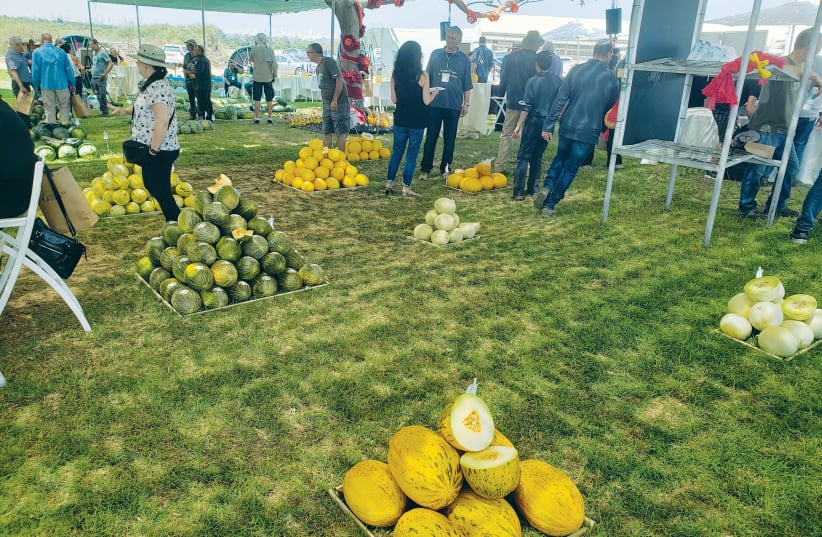The scene was Israeli seed company Origene’s annual convention at their fields in Bnei Darom on July 8.
Israel is among the world leaders in agricultural research, and scientists from the Cucurbit section of the Volcani Institute, which is part of the Agriculture Ministry, helped develop many different varieties of melon that make their way to grocery stores locally and around the world.
Origene and the Volcani Institute have a symbiotic relationship. Volcani develops new pre-breeding material for melons while Origene finalizes the breeding process and distributes the seeds in Israel and around the world.
Yaakov Tamdor, one of the Volcani Institute’s lead researchers, referred to their work as “product-oriented research.” Since Israel has the technological capabilities to invent its own varieties, it can create new markets and get a better sense of supply and demand.
The convention was an opportunity for farmers, vendors, researchers and journalists to try some new and existing varieties. There were watermelons of all shapes, sizes and even colors on display. The smaller melons are better for individual families, while larger, ellipsoid watermelons are best suited for parties or large gatherings.
“There’s a [stigma] that larger watermelons are tastier,” Origene CEO and Chief Breeder Eyal Vardi told The Jerusalem Post. “But that’s simply not true.”
Origene and Volcani work together to create varieties that are suitable for the Israeli market. For example, they make some smaller varieties of watermelon that are easier for people to carry up to their apartments, and larger varieties that are better for large gatherings or parties.
They also taste amazing. Israeli melons are best in the summer when it’s hot and dry. Those are optimal conditions for growing melons. Israel also has a range of climates, allowing production to shift to different areas of the country depending on the season. Vardi also boasted about Israel’s experienced farmers, who he said help make the melons taste so good.
“Together with different varieties and technologies, we learned over the years how to match varieties to seasons to technology,” said Shimshon Omer, head of the Field Crops and Vegetables Department at the Agriculture Ministry.
“That’s how we optimized the growth process to make high-quality melons 365 days a year. What you see on the shelf in [the grocery store] is a result of [optimization] of different regions, technology, and varieties,” he continued.
A cool innovation happens with watermelon. Pure, organic watermelon isn’t resistant to diseases from the ground. Therefore, the watermelon you eat is grafted on pumpkin rootstocks, which is resistant to many soil-born diseases. The resistant pumpkin root enables the watermelon scion to produce tasty fruit. It’s 100% safe since the two vegetables are from the same family.
There’s also a new technology that is going to revolutionize the melon market. It’s called the “superfruiter,” discovered by Tamdor.
The superfruiter is a recessive gene that developed as a result of a chemically induced mutation in melons. A melon line that contains this gene produces on average five times more fruits, which are on average three times smaller.
Tadmor’s group transfers the gene by natural hybridization to various genetic backgrounds, aiming to develop new melon fruit types carrying the superfruiter gene.
Funding for the project comes from COPIA, an Israeli impact fund that works to fund projects in sustainable agriculture. BreedX, an Israeli vegetable breeding platform, then conducts final breeding.
The Volcani Institute conducts breeding-supportive research and development of additional pre-breeding material in Neveh Ya’ar. Researchers are actually using the gene to create bite-sized melons that even have edible outer layers.
There aren’t any commercial varieties of superfruiter melons, but Eyal Cohen from COPIA said he’s targeting a 2024 entry to the market.
Another melon on display was the Galia, developed by the late Zvi Karchi at the Neveh Ya’ar research center in the 1970s. Although the original Galia is no longer consumed, “Galia-type” melons are bred and distributed around the world.
They come in at least three varieties with the green, orange and white ones on display at the convention.
One of the better tasting Galia-type varieties was the “Justin.” It resembles a cantaloupe, and was named after American singer Justin Timberlake, who visited Israel when it was first displayed to the public. In addition to its firm, savory taste, it has a relatively long three-week shelf life and is resistant to different types of climates, making it great to grow and sell all over the world.
However, there are some challenges to growing melons -- one of which was the need to graft melons on pumpkin roots in land infested with soil-born disease. The other is the issue of the viruses and diseases transmitted by insects. It’s difficult to detect when a watermelon has been infected with a virus, according to Volcani scientist Eli Fallik. Until you take a bite, it looks like a normal watermelon.
“Here, there’s no vaccine [for the viruses],” Fallik said. “[Plus], the insects don’t need passports [to make their way to Israel].”
He recommends farmers conduct selective harvests to check for bad melons, but he said that rarely happens. He also proposed that farmers install inspect-proof nets in their fields to prevent the need to use pesticides.
Next year is the seventh year of the shemitah cycle, in which it is halachically forbidden to commercially sell produce, minus some exceptions. Vardi said Origene is following the instructions of the Chief Rabbinate on how to sell their melons in accordance with Halacha.
